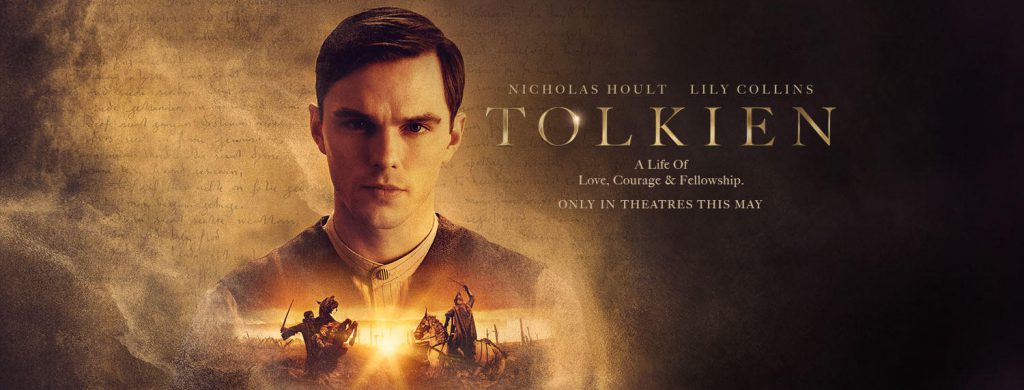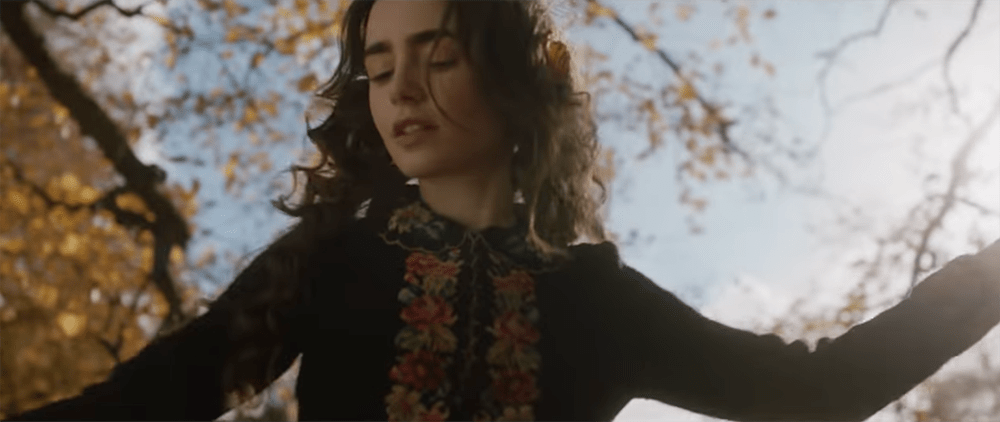Somehow it feels like I’ve been waiting all my life for this film. Over the past 40 years we’ve been treated to unique adaptions of LOTR and THE HOBBIT (live action and animated) to varying degrees of success, yet we have never gotten such a cinematic glimpse into the man himself who created such mythic realms where Elves and Wizards wander. Now acclaimed Finnish director Dome Karukoski (pronounced “doh-MAY”) has taken his hand to his first English-language film and I’m honestly thrilled with the results (yet also left wanting some more, please, sir).
TOLKIEN is a deeply felt, if not complete, portrait of the author I most admire in the world. Don’t fret: there is nothing shoddy, cheap or “fast and loose” with the way this story is told. Against any such fears, this project was certainly made with care. The writing especially, and the casting, music, and cinematography are all first-rate. It satisfies much curiosity for the casual Ringer fan: Karukoski gently pulls back the curtain of history and brings us the first half of Ronald Tolkien’s life, allowing us to feel connected to this person in a whole new way, simply by paying witness. Here is how an orphaned, penniless child was forced to cope and grow up fast, being inspired by many things and people, not knowing he would become the most beloved author of the 20th century.
If your main concern is that the Tolkien Estate did not authorize or participate in this new film, keep in mind they did not approve nor involve themselves in ANY other film adaption of Tolkien’s works over the past 40 years. When Professor Tolkien was alive he made a deal to sell the rights for LOTR and THE HOBBIT for adaptation; wanting to help guarnatee his children a proper education and secure his family’s future. Since that time, because of that previous deal, the Tolkien Estate has not, strictly speaking, approved any of these adaptions we all know. Not the early Rankin/Bass THE HOBBIT that won the Peabody Award – and not the massive Peter Jackson films that won so much acclaim and so many Oscars. This has always been de rigueur for them. It is quite normal for the Estate to say: “We’re not involved here” just to keep the confusion down. Unfortunately many news outlets tried to create scandal and click-bait to color the conversation poorly and to that I say caveat emptor – Buyer Beware. I refer you to my editorial here for more details.
Those movies you love watching over and over? Not approved. All of Howard Shore’s gorgeous music that’s on your playlist? Not approved. Yet it is safe to say millions upon millions of us pop consumers love that stuff with full-throated appreciation and have used them to bring others into our Ringers community. We encourage our friends to read more Tolkien because they liked those films. I just want to knock that irony out of the way when I hear fans say “I’m not going to see the new TOLKIEN biopic because the family dissed it so hard!” Well, come on. It ain’t like that, folks. This gorgeous new film is an opportunity to bring new Ringers closer to knowing the father of our fandom, and to seek further reading (and please, support your local library… seriously).
Speaking of: in my early 20’s when I read Carpenter’s “Tolkien: A Biography” I sought to absorb myself in the man’s life and learn all that I could. It was an interesting read but to a certain extent, sometimes, it left me a little dry. After all, Tolkien’s later life of quiet academia, sometimes filled with great spurts of creativity and many publishing woes, is not one of operatic “sturm and drang” or stunning reversals of fortune like the characters in his stories. This new film does not take us into the era where LOTR was created and does not cover his incredible scholarship. The big payoff here is the sense of immediacy and drama that comes to life. Thanks to a deftly written screenplay by David Gleeson and Stephen Beresford and fantastic performances from the cast, this film has an abundance of flavor, color, and incredibly well-drawn personalities at play.
We start with the unrestrained energy of a lad just moved from South Africa to the green glory of Sarehole Mill, a smart choice to explore when the filmmakers cannot talk about all his later works. Mabel Tolkien was a woman who had to manage two boys without their Father, and she home-schooled Hilary and John Ronald in all the classical languages and learning they would need. Her apperance (played by the lovely Laura Donnelly) is brief but SO very impactful. That her children were brilliant is a testament to her memory. Their new guardian is played by one of my all-time favorite Star Trek actors Colm Meaney, as Father Francis Morgan, who helped mentor Mabel in Catholicism before her untimely death and then stepped in to watch over her sons and make sure they found the best further education at King Edward’s School.
It is at King Edwards where more magic happens for Ronald – where a snooty schoolmaster barely recognizes the talent that just arrived in his classroom – and I’ll never forget the scene where Ronald “shows his quality.” Going from lonely and isolated to finally meeting up with the lads who embraced him by nicknaming him “Tollers” is such a treat.
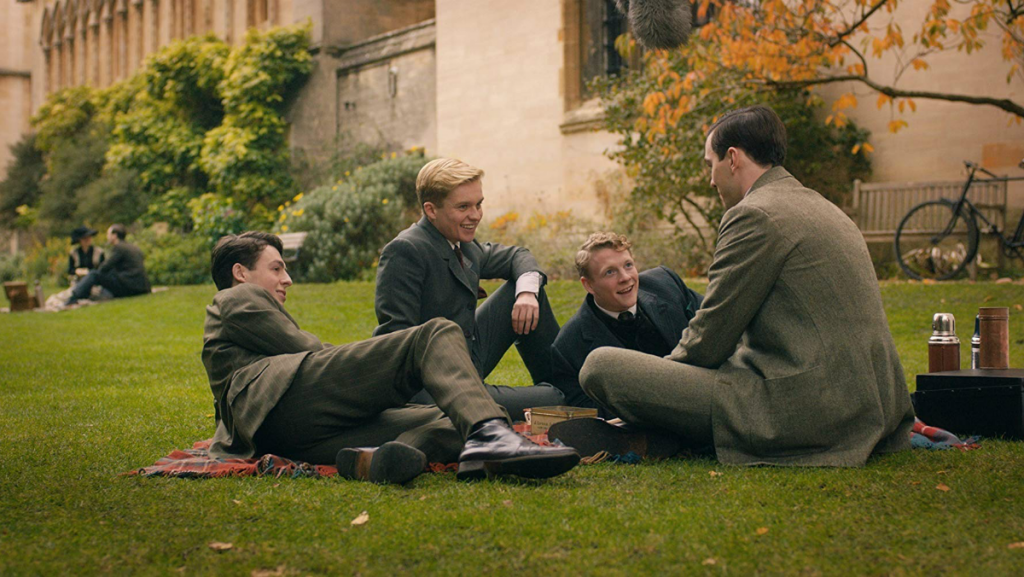 The casting choices in this film are most excellent. The boys of the T.C.B.S are played by two sets of actors, the younger versions and then fast-forward to a few years older. Patrick Gibson (THE TUDORS, THE OA), Anthony Boyle (HARRY POTTER AND THE CURSED CHILD), and Tom Glynn-Carney (DUNKIRK), are incredibly charming and fun to watch in the roles of Robert Gilson, Geoffrey B. Smith, and Christopher Wiseman, respectively. Indeed, the spirit of “Harry Potter” comaraderie is in the room as they drink tea and talk about the power of art to change the world while at Barrow’s Stores (what Tolkien would later call Barrovian since he was so smart with linguistic structure). So the Tea Club Barrovian Society is formed and even stronger bonds of trust and love come to young Ronald at at time when he had lost everything. Karukoski accomplishes so much humor here he earns the goodwill of his audience to a great degree, making the darkness of the impending World War even more compelling.
The casting choices in this film are most excellent. The boys of the T.C.B.S are played by two sets of actors, the younger versions and then fast-forward to a few years older. Patrick Gibson (THE TUDORS, THE OA), Anthony Boyle (HARRY POTTER AND THE CURSED CHILD), and Tom Glynn-Carney (DUNKIRK), are incredibly charming and fun to watch in the roles of Robert Gilson, Geoffrey B. Smith, and Christopher Wiseman, respectively. Indeed, the spirit of “Harry Potter” comaraderie is in the room as they drink tea and talk about the power of art to change the world while at Barrow’s Stores (what Tolkien would later call Barrovian since he was so smart with linguistic structure). So the Tea Club Barrovian Society is formed and even stronger bonds of trust and love come to young Ronald at at time when he had lost everything. Karukoski accomplishes so much humor here he earns the goodwill of his audience to a great degree, making the darkness of the impending World War even more compelling.
One day while quietly folding sheets with his brother, Tolkien hears soft piano music coming from downstairs where they’ve been kindly offered boarding by a certain Mrs. Faulkner, and wandering down to see who it is we discover the first impression of Edith Bratt, another orphan staying in the home, yet three years older than Tolkien, and unaware of the destiny to come.
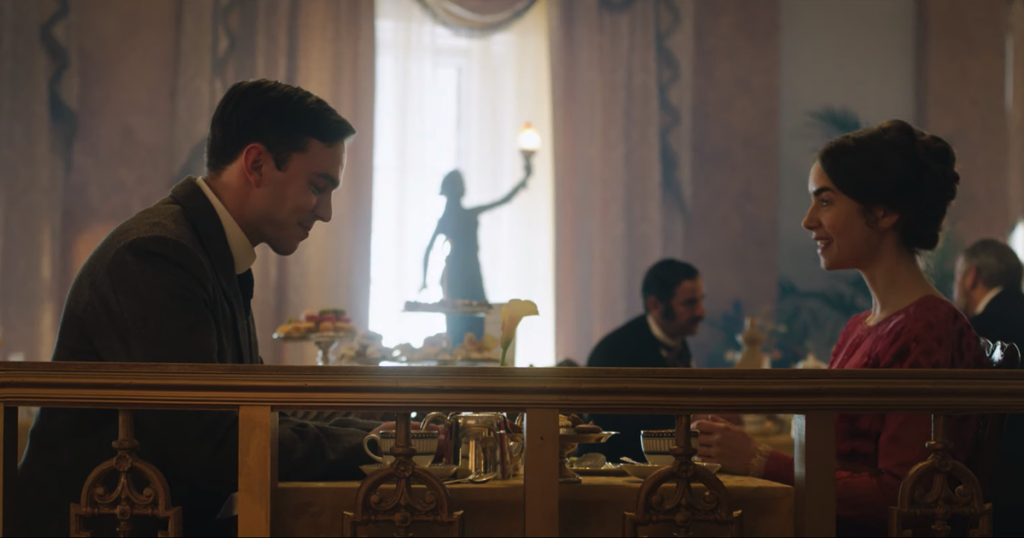 The romance between Ronald and Edith blooms and time moves forward with older actors Nicholas Hoult and Lily Collins playing the leads. They have such chemistry together it sinks deep into your heart. The scene feautred in the main trailer; where the two are at an upscale cafe talking about his invented langauge (something he is quite sheepish about) yet encouraged by his thoughtfulness, Edith asks, “Tell me a story, in any language you want,” will be a scene forever talked about by Ringer fans. Hoult is able to show with such nuance how Tolkien’s mind would work, finding the sense and music and meaning of a word and crafting something of a story from it is brilliantly written and handled by the actors. It’s everything I’ve wanted to see from Tolkien’s life – the combination of erudite linguistics and throwing sugar cubes at people suddenly becomes so romantic….
The romance between Ronald and Edith blooms and time moves forward with older actors Nicholas Hoult and Lily Collins playing the leads. They have such chemistry together it sinks deep into your heart. The scene feautred in the main trailer; where the two are at an upscale cafe talking about his invented langauge (something he is quite sheepish about) yet encouraged by his thoughtfulness, Edith asks, “Tell me a story, in any language you want,” will be a scene forever talked about by Ringer fans. Hoult is able to show with such nuance how Tolkien’s mind would work, finding the sense and music and meaning of a word and crafting something of a story from it is brilliantly written and handled by the actors. It’s everything I’ve wanted to see from Tolkien’s life – the combination of erudite linguistics and throwing sugar cubes at people suddenly becomes so romantic….
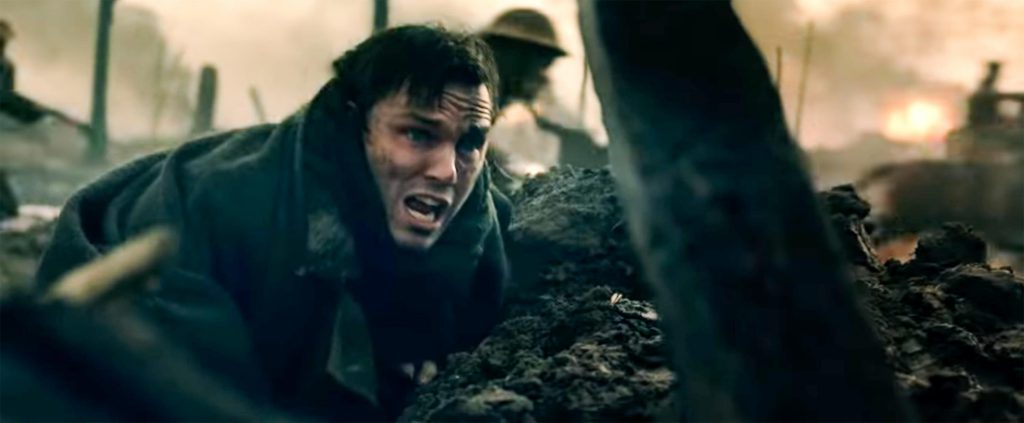 The film employs the framing device of the Battle of the Somme, where Tolkien served on the front from July to October 1916 as a Battalion Signaling Officer with the Lancashire Fusiliers. Abundant imagery from the Great War has appeared in recent cinema; notably in Patty Jenkin’s excellent WONDER WOMAN and Peter Jackson’s stunningly restored docu THEY SHALL NOT GROW OLD. Here Karukoski keenly draws out Ronald’s suffering from trench fever, struggling through gas attacks, gunfire and death to deliver a message to a dear friend. His mind strays in and out – seeing feverish images and shadows. Kudos to the production team and art department for adding to this legacy of affecting war imagery.
The film employs the framing device of the Battle of the Somme, where Tolkien served on the front from July to October 1916 as a Battalion Signaling Officer with the Lancashire Fusiliers. Abundant imagery from the Great War has appeared in recent cinema; notably in Patty Jenkin’s excellent WONDER WOMAN and Peter Jackson’s stunningly restored docu THEY SHALL NOT GROW OLD. Here Karukoski keenly draws out Ronald’s suffering from trench fever, struggling through gas attacks, gunfire and death to deliver a message to a dear friend. His mind strays in and out – seeing feverish images and shadows. Kudos to the production team and art department for adding to this legacy of affecting war imagery.
My favorite scenes involve the deliciously insightful Professor Wright, professor of Comparitive Philology (the post at Oxford that Tolkien would later hold) played by the legendary Sir Derek Jacobi. Thomas Hardy and Virginia Woolf were great admirers of Wright, as was Tokien, who was a great influence on him. Cannot get enough of Sir Derek’s energy! He steals the show just as Dame Judy Dench did in SHAKESPEARE IN LOVE.
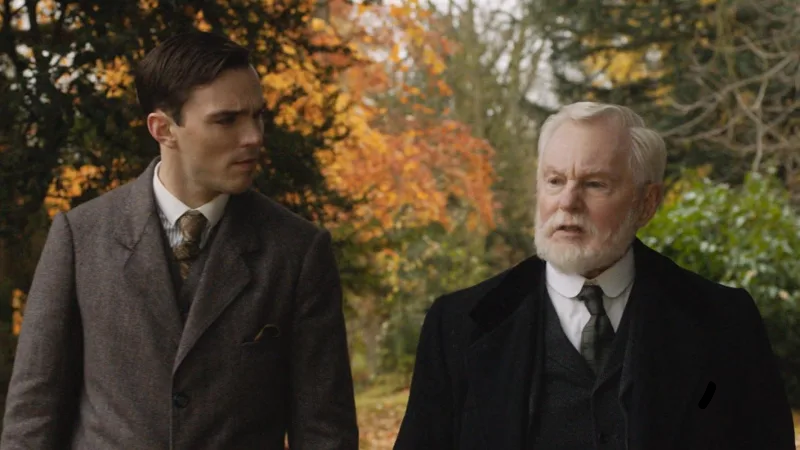 Top marks to the score by Thomas Newman for being deft and unobtrusive at all the right times. Orchestrations range from simple to lushly drawn; I will want to hear this soundtrack again on its own. The period set design and costumes are equally gorgeous. Nothing is lacking from the technical side of this production, especially the luminous photography by Lasse Frank Johannsen.
Top marks to the score by Thomas Newman for being deft and unobtrusive at all the right times. Orchestrations range from simple to lushly drawn; I will want to hear this soundtrack again on its own. The period set design and costumes are equally gorgeous. Nothing is lacking from the technical side of this production, especially the luminous photography by Lasse Frank Johannsen.
Is the chronology of Tolkien’s life accurately represented? Mostly. Some things are moved in and out of their proper order: the moment Edith danced for Ronald in a wood happened not early in their courtship, but later near the end of the War and after their first son was born. The couple had in real life wed *before* Tolkien was shipped off to France, though in the film it is depicted in a different timeframe, where they part from each other in an achingly romantic scene that did not quite happen. But it isn’t disprespectful; nor too off base. Edith actually did choose to break off her engagement with another man to be with John Ronald, just at a different time. Nitpickers: your mileage will vary, but if you’re looking for a documentary, this is not it.
Karukoski is determinedly earnest in this entire production. It is hard to fault him for much because of this earnestness towards his own subject. Keep in mind this project is directed by an accomplished filmmaker that we in English-speaking countries know nothing about. Tolkien was there in his life from very early on: 12 year-old Karukoski was equally charmed by an English author he knew nothing about; yet reading all those Finnish Dwarven names in “The Hobbit” turned on the fires of his imagination by reflecting the familiar within the fantastic. His endeavor here is to bring that artistic line of inspiration full circle.
I won’t spoil it – but I was just blown away by the emotion of the final scene. This is a powerful drama that is not afraid to examine loss. There is much to admire here as a quality piece of filmmaking: the delicate use of lighting, the use of Wagner’s opera in a surpringly winsome way (as if there could ever be such a thing), and the rarified air of actors who are up to the task of handling emotions and intellect with such profundity.
Yet I was left wondering how much more could have been covered, had there been a legal chance to do so. I want to see another film someday about the struggles of Tolkien to balance his scholarship with his crazy ambitious approach to a writing career, delivered to life by the unexpected sudden worldwile success of “The Hobbit,” and all the publishing fights and fueds Tolkien would later have trying to get “Lord of the Rings” completed, unfortunately we never get there. Therefore it is left to other hands to explore the depth of his later life and works; yes I am asking for a sequel, technically authorized by the Estate, that will give us all that stuff too.
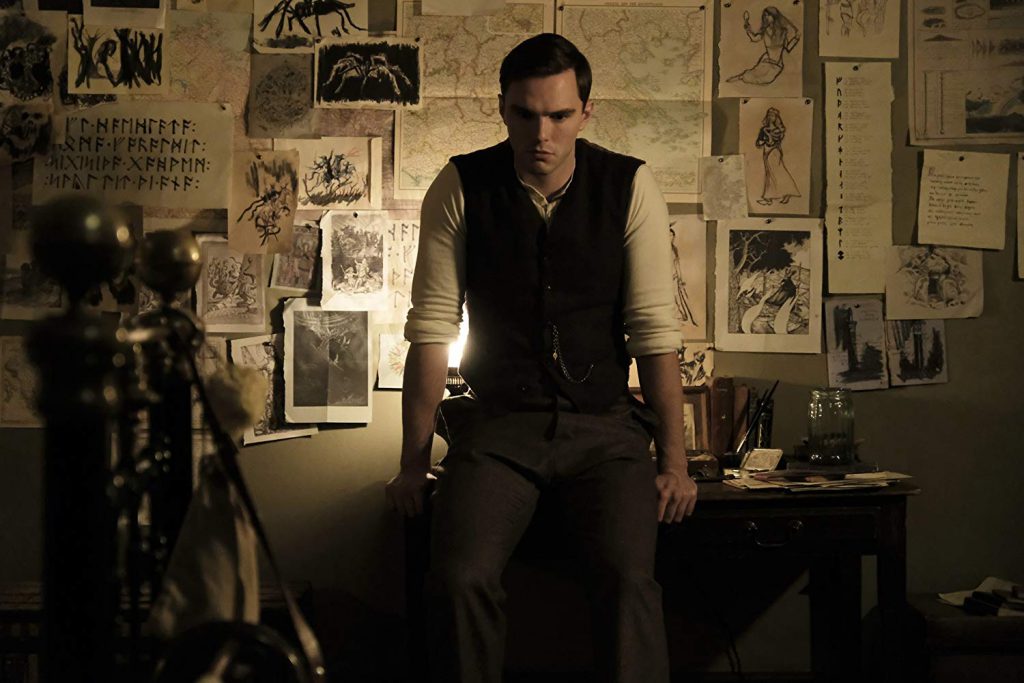 This movie rests perfectly at the intersection of DEAD POETS SOCIETY and recent Oxford Professor Life Story THE THEORY OF EVERYTHING. If this movie was a mess not worthy of your time or did not honor the Professor, trust me, we would tell you. We’re TheOneRing.net and we’ve been doing this for 20 years.
This movie rests perfectly at the intersection of DEAD POETS SOCIETY and recent Oxford Professor Life Story THE THEORY OF EVERYTHING. If this movie was a mess not worthy of your time or did not honor the Professor, trust me, we would tell you. We’re TheOneRing.net and we’ve been doing this for 20 years.
Tolkien was the first super-geek, willing to bring his deeply imaginative “nonsense” into the world only to see people love it. He faced enough loss in one year to match many other person’s lifetimes. TOLKIEN the movie let’s us see and feel his life in an immediate way that only a good film can achieve.
Much too hasty,
Quickbeam
Clifford Broadway
On Twitter: @quickbeam2000
On Instagram: @quickbeam2000


